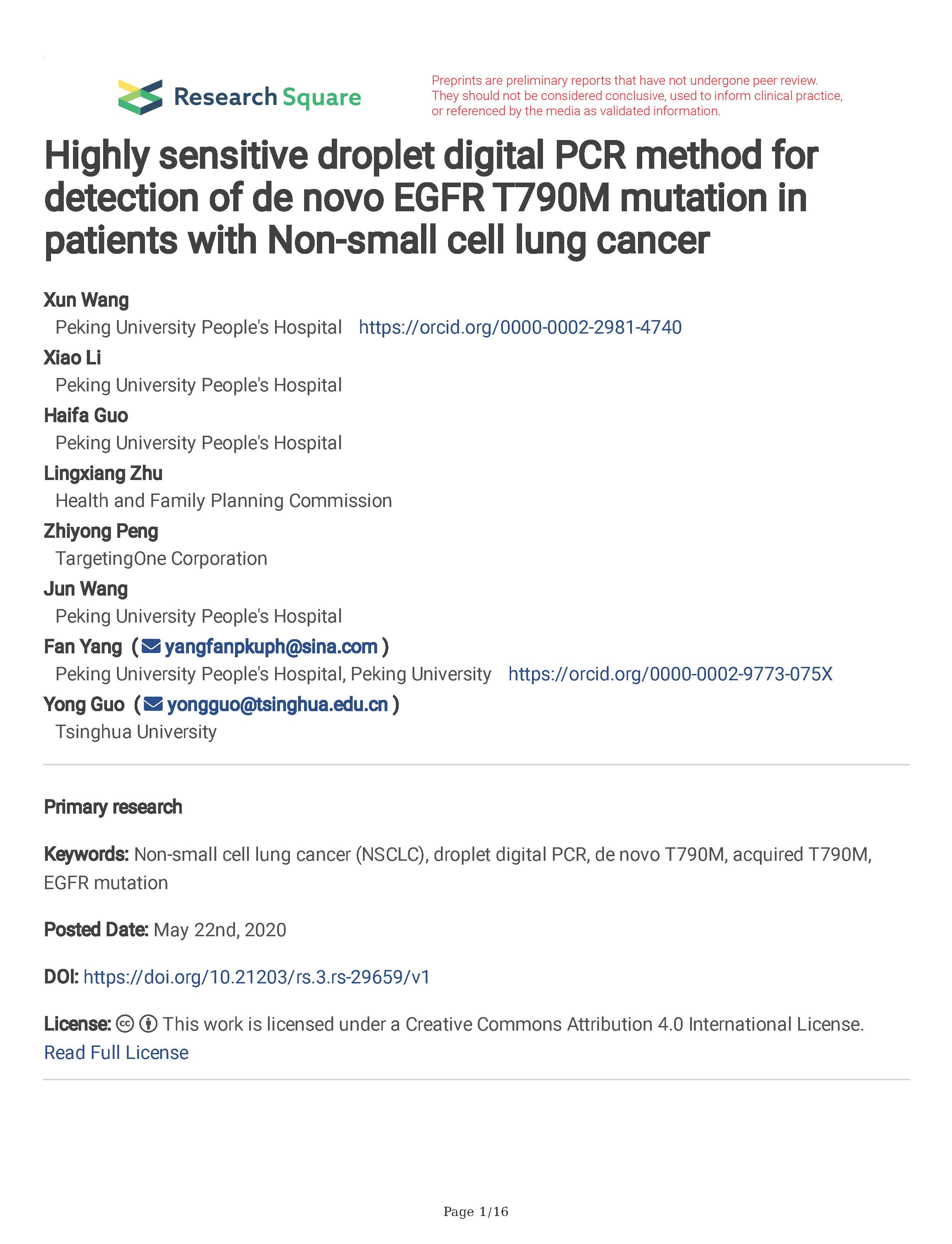release date:2020-05-02
 Background This study was aimed to investigate the allelic relation between de novo T790M and concomitant sensitizing EGFR mutations in EGFR-TKIs naïve NSCLCs and to explore whether the formalin-xed and paran-embedded (FFPE) materials affect the detection of de novo T790M mutation. Methods 300 consecutive EGFR-TKI naïve NSCLCs who received surgical resection between January 2016 and June 2018 was retrospectively investigated. All the snap-frozen tumor tissues from 300 NSCLCs were screened by droplet digital PCR (ddPCR) for the detection of de novo T790M mutation. The allelic relation between de novo T790M mutation and concomitant sensitizing EGFR mutations was also investigated. Furthermore, we assessed de novo T790M mutation in paired FFPE specimens of 50 patients which included tumor tissues and paired normal lung tissues of the pretreatment NSCLCs to investigate whether FFPE materials affect the detection of de novo T790M mutation. Results The de novo T790M mutation was observed in four patients which included one patient of single de novo T790M mutation and three patients of de novo T790M mutation coexisting with L858R mutation. The incidence of de novo T790M in pretreatment NSCLCs who harboring EGFR mutations was 2.9% (4/139). All the de novo T790M mutations were detected in cis with the concomitant L858R mutations for the three NSCLCs. Our ddPCR method demonstrated that the frequency of de novo T790M mutation were ranging from 0.1%to 0.5% among 90% (45/50) of the FFPE tumor samples and 92% (46/50) of the paired FFPE adjacent normal lung samples. The frequency of de novo T790M mutation in the paired snap-frozen samples were all below 0.1%. Conclusion Our study demonstrated that most de novo T790M mutation were detected in cis with concomitant sensitizing mutations for pretreatment NSCLCs. Analytical cut-off of ddPCR assay for FFPE specimens should be validated carefully considering the possibility of FFPE-derived artificial gene mutations.
Background This study was aimed to investigate the allelic relation between de novo T790M and concomitant sensitizing EGFR mutations in EGFR-TKIs naïve NSCLCs and to explore whether the formalin-xed and paran-embedded (FFPE) materials affect the detection of de novo T790M mutation. Methods 300 consecutive EGFR-TKI naïve NSCLCs who received surgical resection between January 2016 and June 2018 was retrospectively investigated. All the snap-frozen tumor tissues from 300 NSCLCs were screened by droplet digital PCR (ddPCR) for the detection of de novo T790M mutation. The allelic relation between de novo T790M mutation and concomitant sensitizing EGFR mutations was also investigated. Furthermore, we assessed de novo T790M mutation in paired FFPE specimens of 50 patients which included tumor tissues and paired normal lung tissues of the pretreatment NSCLCs to investigate whether FFPE materials affect the detection of de novo T790M mutation. Results The de novo T790M mutation was observed in four patients which included one patient of single de novo T790M mutation and three patients of de novo T790M mutation coexisting with L858R mutation. The incidence of de novo T790M in pretreatment NSCLCs who harboring EGFR mutations was 2.9% (4/139). All the de novo T790M mutations were detected in cis with the concomitant L858R mutations for the three NSCLCs. Our ddPCR method demonstrated that the frequency of de novo T790M mutation were ranging from 0.1%to 0.5% among 90% (45/50) of the FFPE tumor samples and 92% (46/50) of the paired FFPE adjacent normal lung samples. The frequency of de novo T790M mutation in the paired snap-frozen samples were all below 0.1%. Conclusion Our study demonstrated that most de novo T790M mutation were detected in cis with concomitant sensitizing mutations for pretreatment NSCLCs. Analytical cut-off of ddPCR assay for FFPE specimens should be validated carefully considering the possibility of FFPE-derived artificial gene mutations.
See all: https://www.researchsquare.com/article/rs-29659/v1